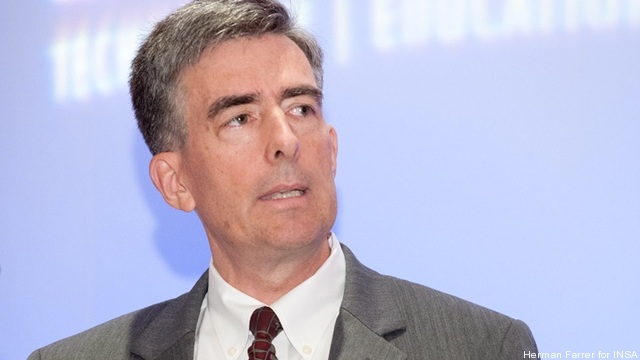What began as a simple way to help veterans view their personal health information over the Internet is continuing to snowball into an electronic health record phenomena known as the Blue Button, now used by more than a million patients nationally and gaining wider adoption by certain health care providers.

The Blue Button is a simple piece of software code that the Department of Veteran Affairs developed two years ago, that lets veterans obtain a copy of their medical information electronically.
VA and health industry officials are now exploring ways to expand its adoption, as well as the types of information patients can access.
At a recently concluded consumer health IT summit, Peter Levin, chief technology officer for the VA described how the Blue Button got started and the impact it has had since in serving veterans.
But he and Dr. Farzad Mostashari, who leads the Office of the National Coordinator for Health Information Technology, also highlighted their vision to grow Blue Button’s user base from “from one million to 10 million to 100 million to the entire country.”
“We want to turn the Blue Button from a noun, to a verb,” said Levin, to a “thing that you do…when you see the Blue Button, you know…you’re going to get your health information.”
Mostashari said he expects immunization records to be accessible via Blue Button in the coming weeks.
But he and Levin said they hope to avoid having distinct types of records added individually.
“You don’t want to do this one at a time,” said Levin. “You’d like to have a methodical way, of not just (adding information) inside government, but most important of all, is doing it outside of government.”
Looking ahead, Mostashari said that it is also important to ensure two things happen:
“First, making the information more usable. But not only making sure that its always human readable, for the patient and the family to have immediate access to the information, but also making it machine readable so developers can develop new tools and services.”
 NASA, the National Science Foundation and the Department of Energy launched a new public challenge contest Wednesday to generate novel approaches to using “big data” information sets from various U.S. government agencies.
NASA, the National Science Foundation and the Department of Energy launched a new public challenge contest Wednesday to generate novel approaches to using “big data” information sets from various U.S. government agencies. Randy Siegel,a mobile computing executive who has worked with the federal government’s civilian, defense and intelligence agencies on mobile strategies and applications for more than a dozen years, has joined Breaking Gov’s
Randy Siegel,a mobile computing executive who has worked with the federal government’s civilian, defense and intelligence agencies on mobile strategies and applications for more than a dozen years, has joined Breaking Gov’s The U.S.
The U.S.  White House officials brought together dozens of senior government leaders and private sector entrepreneurs Monday, including Energy Secretary Dr. Steven Chu, to demonstrate how energy data is fueling new products and services aimed at promoting greater energy efficiency in America.
White House officials brought together dozens of senior government leaders and private sector entrepreneurs Monday, including Energy Secretary Dr. Steven Chu, to demonstrate how energy data is fueling new products and services aimed at promoting greater energy efficiency in America. As cyber security experts continue to look for more effective ways to deter threats, many see the battle over defending network perimeters has become a lost cause, and that new and more creative approaches are becoming essential.
As cyber security experts continue to look for more effective ways to deter threats, many see the battle over defending network perimeters has become a lost cause, and that new and more creative approaches are becoming essential.

 U.S.
U.S.  A top National Security Agency executive argued today that if the nation is to defend against escalating cyber threats, it will be increasingly important for individuals, corporations and institutions, including government, to be held more accountable for their contributions to, and their actions within, cyber space.
A top National Security Agency executive argued today that if the nation is to defend against escalating cyber threats, it will be increasingly important for individuals, corporations and institutions, including government, to be held more accountable for their contributions to, and their actions within, cyber space. Citing a near tripling in the number of malicious software programs aimed at mobile devices in less than a year, a Congressional report is recommending the FCC and other federal agencies take a greater role urging private industry to develop stronger mobile security safeguards.
Citing a near tripling in the number of malicious software programs aimed at mobile devices in less than a year, a Congressional report is recommending the FCC and other federal agencies take a greater role urging private industry to develop stronger mobile security safeguards.
 Borrowing insights gleaned from the FBI and the National Science Foundation, six U.S. lawmakers introduced legislation today that would revamp the leadership structure within NASA and U.S. space program.
Borrowing insights gleaned from the FBI and the National Science Foundation, six U.S. lawmakers introduced legislation today that would revamp the leadership structure within NASA and U.S. space program.